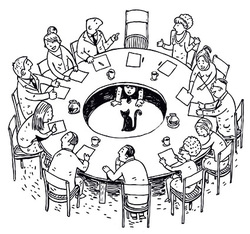
The basic idea of a counsel is to let people come together to discuss various alternative approaches to problems – their pros and cons, and the consequences of carrying out the plans.
As a rule, counsels are well prepared and organised, with a clearly structured dialogue with citizen, interested parties, entrepreneurs, other actors, e.g. within a geographic area. This method occurs in several different variants, and can be applied to situations where aims as well as courses of action are open. It could be a question of e.g. determining the direction and basis for upcoming changes and developments in dialogue with the residents and actors of an area. Proposals are formulated and prioritised, and then handed over to the politicians for decision. Sometimes, the term ‘Counsel’ is used when a municipality or regional board wants the citizens to take sides and prioritise one of two different proposals, either on the Internet or in meetings in the flesh. It is often promised, too, that the proposal that gains most votes will be the one that is carried out. With that it is a method for participation.
It is important to remember that it is an actual case that is handled. If actors and other interested parties are going to contribute and take an active interest, there must be some kind of rootedness in reality. It cannot be some kind of “swimming practice on land” without a clear aim defined in time and space. Make certain that you have the right target group/interested parties and that the adequate number of participants is invited from the start. Engage an experienced process leader who knows how to make the rules and limits clear, and clarify what the participants can have an impact on – their acting space. Do not forget the feedback to the participants after the project, on what was decided and how. This method requires extensive work and efforts beforehand, during and afterwards from officials and politicians.
The main proposals are already crystallised and with that no new proposals can enter the process in this form for counsel.
As a rule, counsels are well prepared and organised, with a clearly structured dialogue with citizen, interested parties, entrepreneurs, other actors, e.g. within a geographic area. This method occurs in several different variants, and can be applied to situations where aims as well as courses of action are open. It could be a question of e.g. determining the direction and basis for upcoming changes and developments in dialogue with the residents and actors of an area. Proposals are formulated and prioritised, and then handed over to the politicians for decision. Sometimes, the term ‘Counsel’ is used when a municipality or regional board wants the citizens to take sides and prioritise one of two different proposals, either on the Internet or in meetings in the flesh. It is often promised, too, that the proposal that gains most votes will be the one that is carried out. With that it is a method for participation.
It is important to remember that it is an actual case that is handled. If actors and other interested parties are going to contribute and take an active interest, there must be some kind of rootedness in reality. It cannot be some kind of “swimming practice on land” without a clear aim defined in time and space. Make certain that you have the right target group/interested parties and that the adequate number of participants is invited from the start. Engage an experienced process leader who knows how to make the rules and limits clear, and clarify what the participants can have an impact on – their acting space. Do not forget the feedback to the participants after the project, on what was decided and how. This method requires extensive work and efforts beforehand, during and afterwards from officials and politicians.
The main proposals are already crystallised and with that no new proposals can enter the process in this form for counsel.
 RSS Feed
RSS Feed
